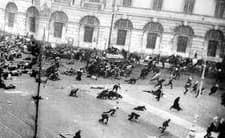Exercise 1
Embibe Experts Social Science Solutions for Exercise 1
Simple step-by-step solutions to Exercise 1 questions of Socialism in Europe and the Russian Revolution from Social Science Textbook of Competency Based Questions for Class IX. Also get 3D topic explainers, cheat sheets, and unlimited doubts solving on EMBIBE.
Questions from Exercise 1 with Hints & Solutions
The July Days. A pro-Bolshevik demonstration on July being fired upon by the army.
What was the response of the Provisional Government to the growing Bolshevik influence in Russia in July ?
In what ways was the working population in Russia are different from other countries in Europe, before
A meeting has been called in your area to discuss the socialist idea of doing away with private property and introducing collective ownership.
What would you do at the meeting if you are:
- A poor labourer working in the fields
- A medium-level landowner
- A house owner
Why did the Tsarist autocracy collapse in
Imagine that you are a striking worker in who is being tried in court for your act of rebellion. Draft the note you would make in your defence.
Imagine that you are a middle-level wheat farmer in Russia after collectivisation. You have decided to write a letter to Stalin explaining your objections to collectivisation.
What would you write about the conditions of your life? What do you think would be Stalin’s response to such a farmer?
In the October Revolution of , the Bolshevik party took control in Russia, leading to the subsequent transformation of the party into the Communist Party of the Soviet Union.
Identify which of the following statements are NOT correct about the Bolsheviks.
I. Most industry and banks were nationalised in November by the Bolsheviks.
II. The Bolsheviks were totally opposed to private property.
III. It was led by Vladimir Lenin, the Bolsheviks seized power in Germany, marking the beginning of the Soviet era.
IV. They were a faction of the Russian Social Secret Labour Party.
List two differences between the capitalist and socialist ideas of private property.

